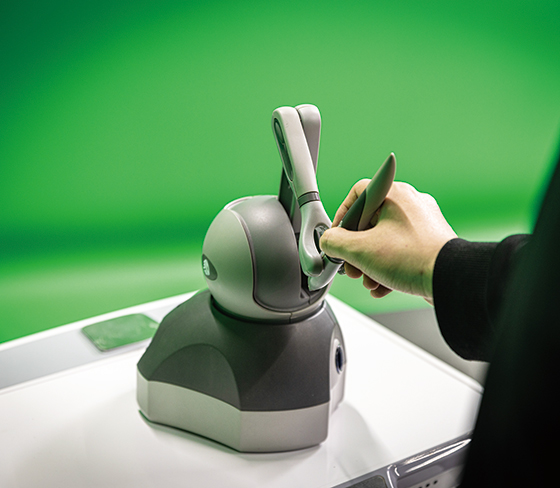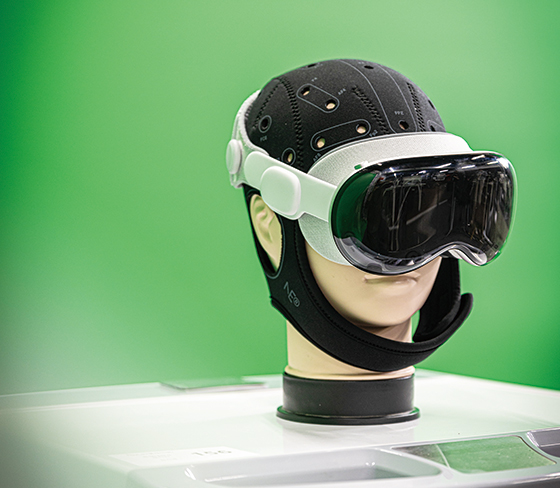Lab & Center
Korea’s only University Research Lab
to Win the CES 2025 Best of Innovation Award
The Play Lab of the Department of HCI, Graduate School of Computing
- Written by YeongIm Park
- Photo by ChoWon Son
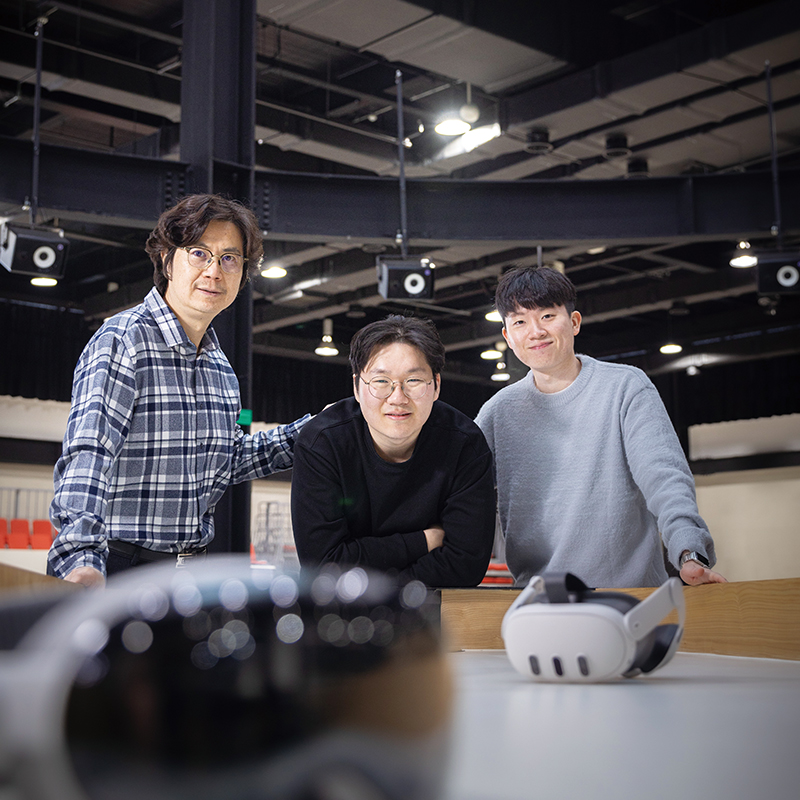 Professor Kibum Kim and the researchers of the Play Lab of the Department of HCI.
Professor Kibum Kim and the researchers of the Play Lab of the Department of HCI.
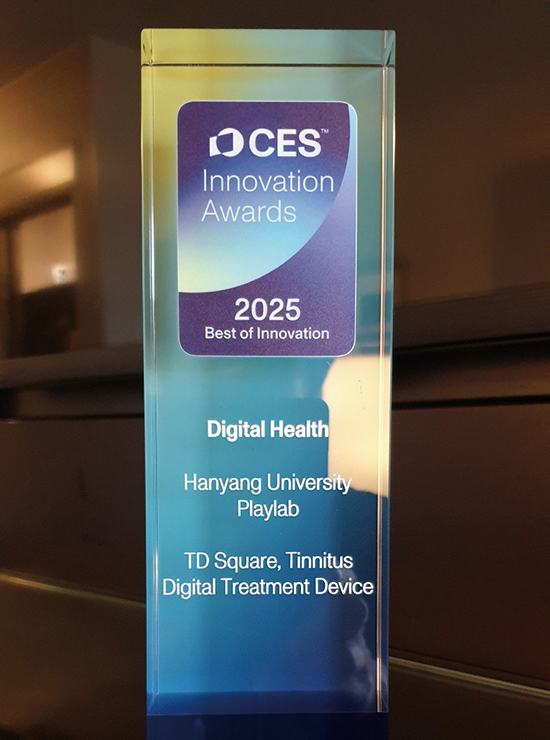 The Game Lab was the first university research lab to win the Best of Innovation award at CES 2025.
The Game Lab was the first university research lab to win the Best of Innovation award at CES 2025.
Selected as the Best New Product in the Digital Health Device Category
Social perceptions of games have been changing for quite some time, and receiving the Best of Innovation Award at the highly competitive CES — where the world’s top new technologies compete — can help make people look at games in a different way. This seems to be the case with Hanyang Play Lab’s Tinnitus Digital Treatment Device (TD2), which won the Best of Innovation Award in the Digital Health Device category at CES 2025.
“When we think of games, we often think of entertainment, but there are also functional games (serious games) designed for specific purposes such as education, training, therapy, and solving social problems. Our lab is developing functional games not just for entertainment, but for purposes like walking training programs for visually impaired individuals or trauma treatment games,” explained a spokesperson for the lab.
Since games that spur interest and increase immersion can amplify effects in education, therapy, etc., more games are now being integrated into various fields. The Play Lab has already developed numerous functional games and published papers in prestigious international journals in the HCI such as HCI, IJHCI, and IJHCS. After developing the tinnitus digital treatment device, the lab applied for a patent and decided to attend CES. However, they never imagined that they would achieve such remarkable results in CES’s core field of digital health devices this year.
“I honestly expected to receive an Innovation Award, but I never dreamed of winning the Best of Innovation Award. I would like to share this award with my fellow researchers at Play Lab who have worked hard over the past five years.”
Conducting laboratory research and paper presentations and engaging in the process of completing prototypes through user testing is of course meaningful to the lab members. But to be able to present at an international exhibition such as CES and then to receive the highest recognition for their work has been an extremely valuable experience for the team. Play Lab researcher JiMun Kim (Class of 2019, Department of HCI, Graduate School of Computing) commented, “Since enrolling in the integrated master’s and Ph.D. program, I’ve been able to learn about the entire process of our work. For instance, I learned a lot about how to report new knowledge in papers and how to navigate administrative procedures to turn research into practical technology for the medical device industry.”
Relieving Tinnitus Through Gameplay
The development of the Tinnitus Digital Treatment Device began in 2020 as part of a cross-departmental research project supported by the Ministry of Science and ICT, the Ministry of Trade, Industry, and Energy, the Ministry of Health and Welfare, and the Ministry of Food and Drug Safety. The project involved the Play Lab led by Professor Kibum Kim, as well as Professor SungKean Kim’s team from the Division of Media, Culture and Design Technology, and Professor Jun Choi’s team from Korea University’s Department of Otolaryngology, and HVR Co., Ltd.
“We combined auditory, visual, and tactile feedback systems with virtual reality technology to create personalized water droplets to generate tinnitus using generative AI. This is called the tinnitus 3D sound avatar. Users wear an HMD and pop the sound-producing water droplets with their hands in a virtual reality environment with multi-sensory stimulation to remove their tinnitus. This helps correct the misperception of tinnitus, much like treatment for phantom limb pain.”
While virtual reality digital therapeutic devices have primarily been applied in the mental health field, such as for autism, the application of this new technology in the field of otolaryngology and its non-invasive treatment method, where patients can use it without injections or medications, has been recognized for its innovation.
Researcher HoJun Ahn (Class of 2022, Department of HCI, Graduate School of Computing) of Play Lab, who was in charge of designing, developing the prototype, and optimizing the device, explained, “To enhance the cognitive therapy effect, the virtual sound used needs to be as similar as possible to the patient's tinnitus sound, so we focused on creating personalized samples using AI. Many visitors at CES showed interest in our device and I’m proud to have positively contributed a little to improving the world.” After the news of their winning the award and introduction of the tinnitus digital device, many tinnitus sufferers reached out to the lab to express their interest in trying the device.
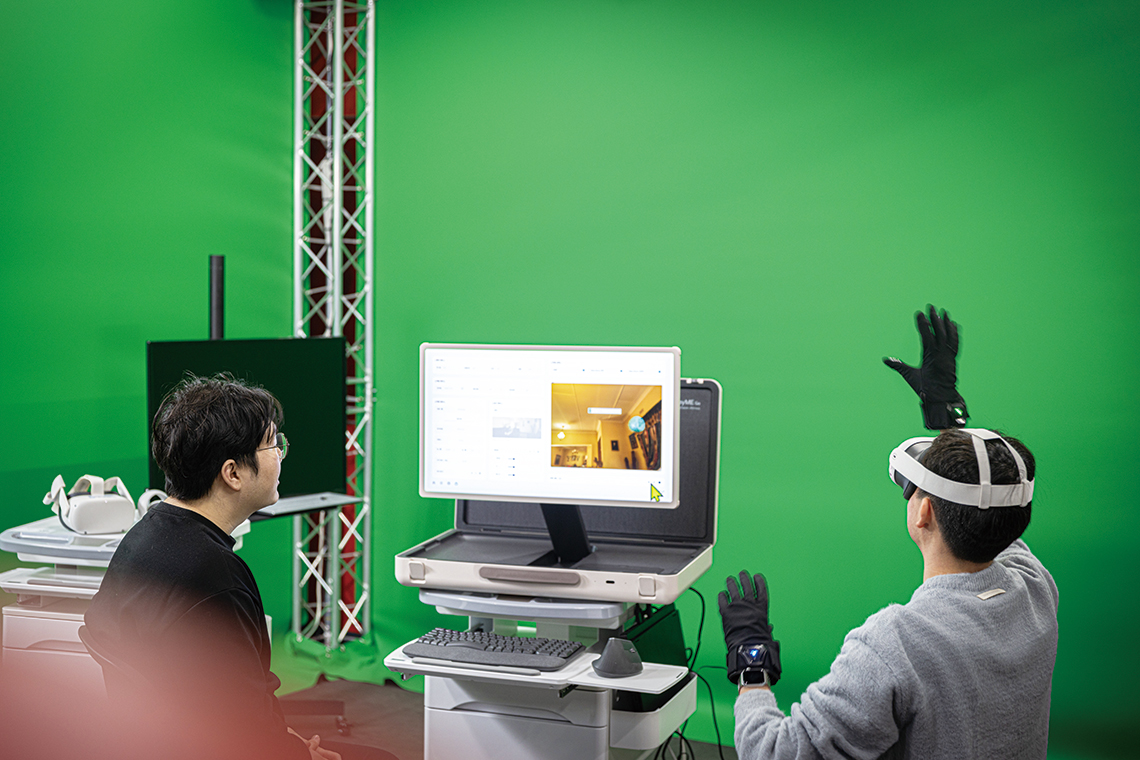 By combining auditory, visual, and tactile feedback systems with virtual reality technology, they created customized water droplets for patient’s tinnitus using generative AI.
By combining auditory, visual, and tactile feedback systems with virtual reality technology, they created customized water droplets for patient’s tinnitus using generative AI.
Contributing to Overcoming the Digital Divide
through the Development of Technologies
Using Virtual, Augmented, and Mixed Reality,
As Well As Gamification

Contributing to Overcoming the Digital Divide
Currently, Play Lab is also working on projects such as the “VR System to Overcome Trauma through Exposure Therapy” with Soonchunhyang University Medical School, supported by the Ministry of Health and Welfare. The lab is also conducting a digital twin project with the Division of Performing Arts at Seokyeong University to support non-verbal communication in stage performances with VR interface and an interaction system. The VR System to Overcome Trauma is being developed to help patients and medical staff recovering from COVID-19 who are anxious about the possibility of re-infection.
The development of HCI technology involves a significant amount of time because the research is only considered complete once a user-friendly interface is created. This is the reason why the Tinnitus Digital Treatment Device research took five years to complete. However, the researchers’ sense of accomplishment has been heightened by the fact that their research is based not only on papers but is actually being applied by actual users, especially to help those in need.
“My first research was on technology for the visually impaired and I am now conducting research based upon my belief that there should be no one left behind due to digital exclusion. Moving forward, the Play Lab will continue to contribute to efforts to overcome the digital divide through the development of technologies using virtual, augmented, and mixed reality, as well as gamification.”
